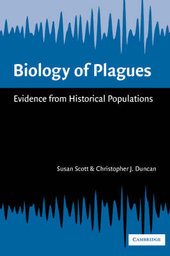
|
Biology of Plagues: Evidence from Historical Populations
Paperback / softback
Main Details
| Title |
Biology of Plagues: Evidence from Historical Populations
|
| Authors and Contributors |
By (author) Susan Scott
|
|
By (author) Christopher J. Duncan
|
| Physical Properties |
| Format:Paperback / softback | | Pages:436 | | Dimensions(mm): Height 228,Width 153 |
|
| ISBN/Barcode |
9780521017763
|
| Classifications | Dewey:614.494 |
|---|
| Audience | | Professional & Vocational | |
|---|
| Illustrations |
18 Tables, unspecified; 121 Line drawings, unspecified
|
|
Publishing Details |
| Publisher |
Cambridge University Press
|
| Imprint |
Cambridge University Press
|
| Publication Date |
21 July 2005 |
| Publication Country |
United Kingdom
|
Description
The threat of unstoppable plagues, such as AIDS and Ebola, is always with us. In Europe, the most devastating plagues were those from the Black Death pandemic in the 1300s to the Great Plague of London in 1665. For the last 100 years, it has been accepted that Yersinia pestis, the infective agent of bubonic plague, was responsible for these epidemics. This book combines modern concepts of epidemiology and molecular biology with computer-modelling. Applying these to the analysis of historical epidemics, the authors show that they were not, in fact, outbreaks of bubonic plague. Biology of Plagues offers a completely new interdisciplinary interpretation of the plagues of Europe and establishes them within a geographical, historical and demographic framework. This fascinating detective work will be of interest to readers in the social and biological sciences, and lessons learnt will underline the implications of historical plagues for modern-day epidemiology.
Author Biography
Susan Scott is a research worker in historical demography in the School of Biological Sciences, at the University of Liverpool. Christopher J. Duncan is Emeritus Professor of Zoology also in the School of Biological Sciences at the University of Liverpool.
Reviews'Biology of Plagues is a fascinating read for those interested in the history of infectious disease and it is provocative and thought provoking.' Richard W. Titball, Lancet ' ... the authors of this challenging book are to be commended for bringing together much fascinating information about plagues.' Times Higher Education Supplement
|